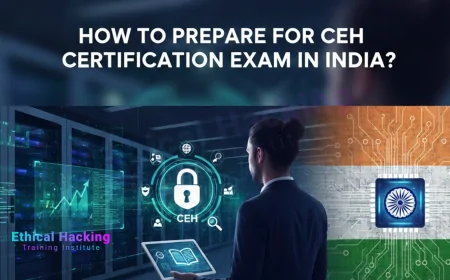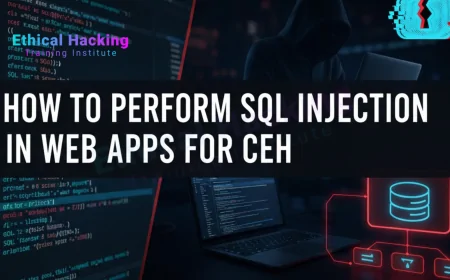Certified Ethical Hacker Training: What You Need to Know Before Starting | Starting Your CEH Training? Here’s What You Need to Know First
Explore Certified Ethical Hacker (CEH) training in 2025—eligibility, syllabus, costs, labs, formats, and top tips before you begin.

Table of Contents
- Introduction
- Why CEH Training Matters
- Eligibility Requirements
- Training Formats Explained
- What You'll Learn (CEH Syllabus)
- Importance of Hands-On Labs
- Training Costs & Exam Fees
- Choosing an Accredited Provider
- Preparation Tips Before You Begin
- Top Mistakes to Avoid
- Career Paths After CEH
- Certification Renewal & Continuing Education
- CEH vs. Other Cybersecurity Certifications
- What to Expect on Exam Day
- Soft Skills & Mindset
- Recommended Resources
- FAQs
- Conclusion
Introduction
Certified Ethical Hacker (CEH) training equips professionals with the knowledge and skills to legally penetrate systems, identify vulnerabilities, and improve cybersecurity defense. In a world where cyber threats grow daily, CEH is an internationally recognized diagnostic for ethical hacking capability.
Why CEH Training Matters
In 2025, cybersecurity threats are more sophisticated than ever—and so are the hackers behind them. Businesses today must go beyond traditional defense mechanisms to proactively identify and mitigate security threats. They need proactive professionals who understand how attackers think. This is exactly where Certified Ethical Hacker (CEH) training comes into play.
Here’s why CEH training is critical for today’s cybersecurity landscape:
1. Learn to Think Like a Hacker
CEH training teaches you how to “think offensively.” You’ll explore the same tactics used by black-hat hackers—reconnaissance, scanning, exploitation, privilege escalation, and data exfiltration—but for legal and ethical purposes.
This shift in mindset—from defense to offense—equips you to predict and preempt attacks before they happen.
2. Structured and Comprehensive Curriculum
The CEH certification is widely recognized as a leading credential in the field of ethical hacking. From web application security to cloud, IoT, mobile, and AI-driven attacks, CEH gives you a 360-degree understanding of current vulnerabilities.
You don’t just learn what to protect—you learn how attackers get in.
3. Hands-On Lab Experience
Unlike theoretical certifications, CEH offers access to real-world lab environments (like EC-Council’s iLabs), where you get to practice over 2200 tools such as Nmap, Metasploit, Wireshark, John the Ripper, Burp Suite, and more.
These simulations build genuine, job-ready hacking skills—not just exam knowledge.
4. Globally Recognized Credential
The CEH certification is widely recognized as a leading credential in the field of ethical hacking. It is compliant with ANSI 17024, recognized by US DoD 8570/8140, and trusted by Fortune 500 companies, governments, and defense agencies worldwide.
A CEH certification instantly validates your credibility as a cybersecurity professional.
5. Opens Career Opportunities
With CEH on your résumé, you unlock doors to roles such as:
-
Ethical Hacker
-
Penetration Tester
-
SOC Analyst
-
Cybersecurity Consultant
-
Vulnerability Assessor
CEH is often a minimum requirement for job roles in cybersecurity, especially in penetration testing and red teaming.
6. Keeps You Updated with Industry Trends
The CEH certification evolves every few years to reflect real-world threats and tools. The current version (CEH v13) includes content on cloud security, OT/ICS hacking, AI-powered attacks, and modern malware trends.
CEH ensures your skills stay relevant in a fast-changing industry.
7. Ideal Starting Point for Advanced Certifications
CEH acts as a launchpad for further specializations like:
-
CEH Practical
-
CPENT (Certified Penetration Testing Professional)
-
LPT (Licensed Penetration Tester)
-
OSCP (Offensive Security Certified Professional)
It provides the foundational knowledge needed to pursue more technical or managerial cybersecurity roles.
Eligibility Requirements
- No prior training? → Official EC‑Council training is required
- No training? → Must have 2+ years’ InfoSec work experience + application approval
Training Formats Explained
Choose from:
- Self-paced online – personal timeline, ideal for disciplined learners.
- Instructor-led live (online or classroom) – structured with real-time interaction.
- Bootcamp format – intensive, short-term sessions covering the full syllabus in days.
What You'll Learn (CEH Syllabus)
The CEH v13 syllabus covers modules such as:
- Reconnaissance & Footprinting
- Scanning Networks & Enumeration
- System & Malware Threats
- Sniffing & Session Hijacking
- Web Application & SQL Injection
- Wireless & IoT & Cloud Hacking
- Cryptography & Penetration Testing Methodology
Importance of Hands-On Labs
Practical labs simulate real attack scenarios—evaluating, exploiting, and securing systems using tools like Nmap, Metasploit, Wireshark, Burp Suite, etc. The best training offers browser-based, 24/7 lab access, boosting both skill and confidence.
Training Costs & Exam Fees
Typical price ranges (2025, India/USD):
- Self‑study course: ₹30,000–₹50,000 / $300–600
- Instructor‑led (with lab): ₹60,000–₹1,00,000 / $900–1,200
- Bootcamp: ₹80,000+ / $1,200+
- Exam voucher: ₹45,000 or $700
Choosing an Accredited Provider
To be exam-eligible, train with an Accredited Training Center (ATC) or apply with suitable experience. Accredited providers in India include EC-Council iClass, WebAsha, InfosecTrain, Koenig Solutions, and Simplilearn.
Preparation Tips Before You Begin
- Set a realistic study schedule.
- Install virtual labs (Kali, Parrot).
- Get official EC-Council books and practice exams.
- Join communities (GitHub, Reddit, Discord).
- Record progress: summaries, mind-maps, and lab logs.
Top Mistakes to Avoid
- Relying only on theory—labs are essential.
- Skipping foundational networking knowledge.
- Not scheduling timed mock tests.
- Overlooking updates (use latest CEH version).
Career Paths After CEH
CEH certification opens doors to roles such as:
- Penetration Tester
- Ethical Hacker
- Security Consultant
- SOC Analyst
- VAPT Specialist
Certification Renewal & Continuing Education
Becoming a Certified Ethical Hacker (CEH) is just the beginning. Like all professional credentials, maintaining its validity and relevance requires ongoing effort. EC-Council mandates a renewal process to ensure certified professionals stay current with evolving cybersecurity threats and technologies.
Here’s what you need to know about CEH certification renewal and continuing education:
CEH Certification Validity Period
Once you earn the CEH credential, it is valid for three years from the date of certification. After this period, you must meet renewal requirements to maintain your active certification status.
How to Renew Your CEH Certification
CEH renewal is managed under the EC-Council Continuing Education (ECE) program. To renew your certification, you must:
Earn 120 ECE Credits Over 3 Years
You are required to earn a minimum of 120 credits within the 3-year cycle. That breaks down to 40 ECE credits per year.
What Qualifies as ECE Activities?
There are many ways to earn ECE credits. Here are some approved activities:
| Activity | Credits |
|---|---|
| Attending cybersecurity webinars or seminars | 1–3 credits/hour |
| Publishing a cybersecurity article or whitepaper | Up to 40 credits |
| Teaching or training CEH-related material | 1–3 credits/hour |
| Completing other certifications (e.g., CISSP) | Varies (10–40+) |
| Participating in CTFs or security competitions | 5–20 credits/event |
| Attending EC-Council events or summits | 1–5 credits/event |
| Taking advanced EC-Council courses |
CEH vs. Other Cybersecurity Certifications
| Cert | Focus | Ideal For |
|---|---|---|
| CEH | Ethical Hacking | Pen Test Beginners |
| OSCP | Advanced Pen Testing | Experienced Pentesters |
| Security+ | Security Fundamentals | Entry-Level Security |
| CISSP | Security Management | Policy & Leadership Roles |
What to Expect on Exam Day
Exam is 125 MCQs, 4 hours long. Online delivery with live proctor—have stable internet, clean desk, and ID ready. Review tools before clicking “Submit”.
Soft Skills & Mindset
Critical thinking, attention to detail, persistence, professional ethics, and effective communication are essential complementaries to your technical tools.
Recommended Resources
- Official EC‑Council CEH Study Guide
- EC‑Council’s iLabs (virtual labs)
- Practice partners: Boson, MeasureUp, Exam-Labs
- Community forums: StackExchange, TechExams, Reddit r/ceh
FAQs
1. What is CEH?
CEH is the Certified Ethical Hacker credential by EC‑Council, focused on penetration testing and security assessment.
2. Do I need prior hacking experience?
No—but official training or 2 years InfoSec experience is required.
3. What is the downtime for CEH prep?
4–8 weeks with regular study of 1–2 hrs daily.
4. Can I train and take the exam at home?
Yes—online formats and proctored remote exams are widely available.
5. What tools do I need?
Basic: Kali Linux, virtual machine software, Wireshark, Nmap, Metasploit.
6. How many questions in the exam?
125 multiple-choice questions; 4-hour duration.
7. What is the passing score?
Ranges between 60–85% depending on exam set.
8. How much does training cost?
₹30k–₹1l+ (India) or $300–1.2k+ (USD), including exam voucher.
9. How long is certification valid?
Three years, renewable with 120 ECE credits.
10. Should I attempt OSCP instead?
OSCP is more technical; CEH is often better suited for beginners to mid-level roles.
11. Is programming required?
Basic scripting (e.g., Python/Bash) helps, but is not mandatory.
12. What are EC-Council iLabs?
They are cloud-based labs to practice 2200+ tools and real-world simulations.
13. How to pick a training provider?
Look for EC‑Council ATC accreditation, lab access, exam voucher inclusion, and placement support.
14. Is CEH recognized internationally?
Yes, widely accepted in government, defense, finance, and tech sectors globally.
15. Can beginners pass CEH?
Absolutely—with structured training, lab practice, and consistent study.
16. How often is CEH updated?
Every 2–3 years; currently at v13 in 2025.
17. What jobs become available after CEH?
Roles include Ethical Hacker, Pen Tester, Security Analyst, SOC Analyst, and Auditor.
18. Any soft skills needed?
Yes—problem-solving, ethics, communication, teamwork.
19. What mistakes do people make?
Focusing only on theory, ignoring labs, skipping mock tests, using outdated resources.
20. What’s next after CEH?
Pursue CEH Practical, CPENT, OSCP, LPT, or specialize in areas like SOC, Cloud, and IoT security.
18. Conclusion
Certified Ethical Hacker training is more than certification—it’s a career launchpad. With a solid roadmap, disciplined study, lab focus, and ethical mindset, CEH equips you to defend the digital frontier. As cyber threats grow, your skills will be in increasing demand. Prepare smart, train hard, and set a strong foundation for a successful career in cybersecurity.
What's Your Reaction?
 Like
0
Like
0
 Dislike
0
Dislike
0
 Love
0
Love
0
 Funny
0
Funny
0
 Angry
0
Angry
0
 Sad
0
Sad
0
 Wow
0
Wow
0
















